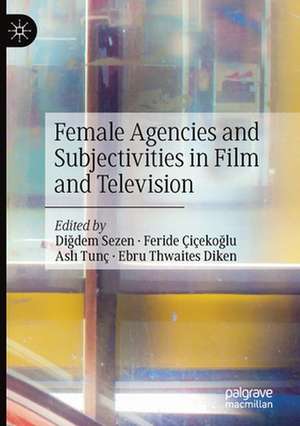Female Agencies and Subjectivities in Film and Television
Editat de Diğdem Sezen, Feride Çiçekoğlu, Aslı Tunç, Ebru Thwaites Dikenen Limba Engleză Paperback – 30 oct 2021
| Toate formatele și edițiile | Preț | Express |
|---|---|---|
| Paperback (1) | 726.85 lei 6-8 săpt. | |
| Springer International Publishing – 30 oct 2021 | 726.85 lei 6-8 săpt. | |
| Hardback (1) | 732.07 lei 6-8 săpt. | |
| Springer International Publishing – 30 oct 2020 | 732.07 lei 6-8 săpt. |
Preț: 726.85 lei
Preț vechi: 886.41 lei
-18% Nou
Puncte Express: 1090
Preț estimativ în valută:
139.10€ • 144.12$ • 116.09£
139.10€ • 144.12$ • 116.09£
Carte tipărită la comandă
Livrare economică 21 martie-04 aprilie
Preluare comenzi: 021 569.72.76
Specificații
ISBN-13: 9783030561024
ISBN-10: 303056102X
Pagini: 300
Ilustrații: XVII, 300 p. 6 illus.
Dimensiuni: 148 x 210 x 3 mm
Greutate: 0.42 kg
Ediția:1st ed. 2020
Editura: Springer International Publishing
Colecția Palgrave Macmillan
Locul publicării:Cham, Switzerland
ISBN-10: 303056102X
Pagini: 300
Ilustrații: XVII, 300 p. 6 illus.
Dimensiuni: 148 x 210 x 3 mm
Greutate: 0.42 kg
Ediția:1st ed. 2020
Editura: Springer International Publishing
Colecția Palgrave Macmillan
Locul publicării:Cham, Switzerland
Cuprins
1. Introduction.- 2. Agnès Varda and the Singular Feminine.- 3. Female Agency in Pelin Esmer Films: The Play (2005) and Queen Lear (2019).- 4. The Feminine Indistinction in Susanne Bier’s Cinema: The Brothers (2005), In a Better World (2010), Bird Box (2019).- 5. Consuming Bodies, Abject Spaces: Ana Lily Amirpour’s Transcultural Expressionism.- 6. Claire Underwood: Feminist Warrior or Shakespearean Villain? Re-visiting Feminine Evil in House of Cards.- 7. The Phenomenology of Orphan Black as Molecular Politics.- 8. ‘I will not be bullied into submission’: Discussing subjection and resistance in GLOW (2017).- 9. Female Body Language: Cutting, Scarring, and Becoming in HBO’s Sharp Objects.- 10. The Strong Female Lead: Postfeminist Representation of Women and Femininity in Netflix Shows, Derya Özkan, Deborah Hardt.- 11. The Technological Turn of the Femme Fatale: The Fembot and Alternative Fates.- 12. Women Remembering: Gender and Genre in Persona and Happy Valley.- 13. Bridal anxieties: Politics of gender, neoconservatism and daytime TV in Turkey.- 14. International Filmmor Women’s Film Festival on Wheels: “Women’s Cinema, Women’s Resistance, Cinema of Resistance."- 15. Machine gaze on women: How everyday machine-vision-technologies see women in films.
Notă biografică
Diğdem Sezen is a lecturer at Teesside University, School of Computing, Engineering and Digital Technologies, Department of Communications, Media and Arts, UK. She holds a Ph.D. from Istanbul University, Turkey.
Feride Çiçekoğlu holds a Ph.D. in architecture from University of Pennsylvania, USA. Her stint in prison during the military junta of 1980 in Turkey was the inspiration for her first novella, which she later adapted to screen and used as a springboard to build a second academic career in film.
Aslı Tunç is a professor of media studies and communication at Department of Media at Istanbul Bilgi University, Turkey. She holds a Ph.D. in media and communications at Temple University, USA.
Ebru Thwaites Diken is an assistant professor in the Department of Film and Television at İstanbul Bilgi University, Turkey. She holds a a PhD in Sociology from Lancaster University, UK.
Aslı Tunç is a professor of media studies and communication at Department of Media at Istanbul Bilgi University, Turkey. She holds a Ph.D. in media and communications at Temple University, USA.
Ebru Thwaites Diken is an assistant professor in the Department of Film and Television at İstanbul Bilgi University, Turkey. She holds a a PhD in Sociology from Lancaster University, UK.
Textul de pe ultima copertă
“This volume is an exuberant account of the ways in which female agencies and subjectivities in visual culture have expanded and multiplied through digital technology and globalization. It is an invaluable contribution to contemporary discussions in film and television studies, as well as feminist theory and practice.”
-Süheyla Schroeder, Berlin International University of Applied Sciences, Germany
-Süheyla Schroeder, Berlin International University of Applied Sciences, Germany
Diğdem Sezen is a lecturer at Teesside University, School of Computing, Engineering and Digital Technologies, Department of Communications, Media and Arts, UK. She holds a Ph.D. from Istanbul University, Turkey.
Feride Çiçekoğlu holds a Ph.D. in architecture from University of Pennsylvania, USA. Her stint in prison during the military junta of 1980 in Turkey was the inspiration for her first novella, which she later adapted to screen and used as a springboard to build a second academic career in film.
Aslı Tunç is a professor of media studies and communication in the Department of Media at Istanbul Bilgi University, Turkey. She holds a Ph.D.in media and communications from Temple University, USA. Ebru Thwaites Diken is an assistant professor in the Department of Film and Television at İstanbul Bilgi University, Turkey. She holds a a PhD in Sociology from Lancaster University, UK.
Aslı Tunç is a professor of media studies and communication in the Department of Media at Istanbul Bilgi University, Turkey. She holds a Ph.D.in media and communications from Temple University, USA. Ebru Thwaites Diken is an assistant professor in the Department of Film and Television at İstanbul Bilgi University, Turkey. She holds a a PhD in Sociology from Lancaster University, UK.
Caracteristici
Discusses the concepts of female agency and subjectivities in film and television through cases in the last decade, investigating emerging notions in the field and introducing original research Focuses on how the politics of gender are mediated, what kind of transformative power film and television narratives poses and how technological developments and new media forms challenge existing perspectives and re-imagine the possible future directions Offers intercultural and international perspectives on globally distributed film and television content, as well as bringing critically acclaimed non-Western examples into focus
